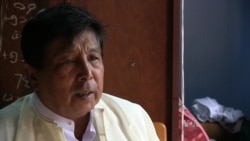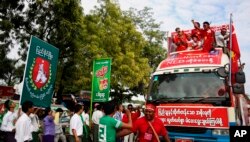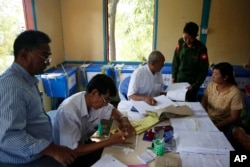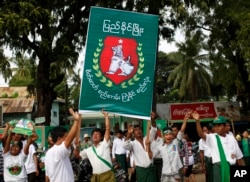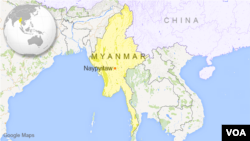There are no roadside billboards advertising Khin Maung Thein’s candidacy for a seat in Myanmar’s parliament.
The 71-year-old, standing for a Lower House seat in Mandalay’s Chanayetharzan township, is one of only a handful of Muslim candidates running low-key campaigns for office in Myanmar’s landmark elections on Sunday.
The country that began to emerge from dictatorship following a choreographed election in 2010 has since that time seen rising interreligious tensions.
Violence
Communal violence spread from Rakhine state in the west, where Muslims who call themselves Rohingya are denied citizenship and have faced attacks on their communities.
“Myanmar’s whole Muslim community is facing big trouble at the present,” Khin Maung Thein told VOA.
Mandalay itself experienced riots in July last year after a rape allegation – which later turned out to be false – was spread on social media by members of a resurgent nationalist movement led by Buddhist monks.
Khin Maung Thein is the only Muslim standing for office in a city that is expected to elect mostly candidates from Aung San Suu Kyi’s National League for Democracy (NLD).
The popular opposition party, following the lead of the military-backed ruling Union Solidarity and Development Party (USDP), purged its candidate list of Muslims in order to avoid provoking Buddhist nationalists.
But despite their lack of representation in the party, many of Myanmar’s Muslims still support the NLD.
On the wall of Khin Maung Thein’s dusty office, an ornamental picture of Suu Kyi underlines her popularity, even among her party’s opponents.
“I love her,” he confided. If elected, he said he would throw his support behind the NLD in the parliament in Naypyidaw.
But the Muslim candidate faces an uphill struggle, with his campaign muted in an atmosphere of nationalist rhetoric that casts Muslims as unwanted interlopers in Myanmar, also known as Burma.
Muslim ethnic group
Khin Maung Thein identifies as a Pathi, a Muslim ethnic group that traces its roots in Myanmar back to a precolonial period when followers of Islam held a prominent place in the Mandalay court of the last king of Myanmar.
His party, the United National Congress, is a small group putting up only 12 candidates to run for the more than 1,100 seats open in Sunday's national election.
“I can only just afford the fee to register as a candidate. I can’t afford any stickers or T-shirts for the campaign,” Khin Maung Thein said.
But Khin Maung Thein, who in the late 1970s was jailed for almost two years for his role as an underground communist party agitator, is hoping that simply having his name on ballot papers will be a symbol of defiance.
“It’s about dignity for the Islamic people,” he said. “If we didn’t have this party, then it would not be good for our community.”
Nyi Nyi Kyaw, a former student activist and founder of the Election Observer Network-Mandalay, said that anti-Muslim sentiment had been stirred in Mandalay by the Organization for the Protection of Race and Religion – known by the Burmese acronym Ma Ba Tha – a panel of Buddhist monks including the firebrand Wirathu, who heads a large monastery in the city.
The group was active in and around Mandalay in September, Nyi Nyi Kyaw said.
“In the early period of the campaign, they went around to each house and gave out [anti-Muslim] CD’s and pamphlets to the people,” he said. “They say that the NLD is a party for Islamic people. It’s manipulation.”
Group's message
Nyi Nyi Kyaw said residents of cosmopolitan Mandalay were not overly influenced by these messages, but the group appears to have sway at the highest reaches of Myanmar’s current government, headed by President Thein Sein of the USDP.
A package of deeply conservative legislation proposed by the group was passed into law earlier this year and is now in force, restricting interfaith marriage, religious conversion, extramarital relationships and reproductive rights.
The Atlanta-based Carter Center, which is monitoring Myanmar’s elections, said in a report last month that its observers in all parts of Myanmar “heard concerns from parties and community members about the potentially disruptive use of nationalist and religious rhetoric during campaigning.”
Ma Ba Tha complaints
The Carter Center highlighted the role of Ma Ba Tha’s monks, who claim to be politically neutral, but have appeared in favor of the ruling party during rallies taking place during the election campaign period.
“Although the rallies passed without incident, there have been at least four official complaints alleging the misuse of religion during the campaign, including dissemination of Ma Ba Tha materials targeting particular candidates,” the Carter Center said. “Parties have not received an official response to these complaints.”
Despite this difficult election atmosphere, 68-year-old Muslim Chit Htun, a resident of Mandalay and a former civil servant, said he would place his vote with Khin Maung Thein.
“We just want to show that there is a Pathi Muslim community here,” he said. “We don’t want to be forgotten.”




